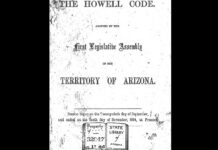The three Arizona state legislators who represent Sedona, Sen. Ken Bennett, Rep. Selina Bliss and Rep. Quang H. Nguyen, sent a letter to Sedona Mayor Scott Jablow and the Sedona City Council on June 5 warning the city about the possible illegality of Jablow’s proposed ordinance to regulate off-highway vehicles.

Writing in their official capacities and after consulting with the legislature’s staff attorneys, the legislators warned the city that the proposed ordinance “purports to exercise police power,” noting that “Arizona courts have long recognized that although ‘the state has broad police power,’ municipalities have ‘no inherent police power.’”
The legislators warn that “Arizona courts have rejected municipal ordinances that conflict with state statutes … particularly when such ordinances involve the police powers of the state.”
The legislators added, “Accordingly, the proposed OHV ordinance must have statutory authorization to be a permissible exercise of the police power,” citing Arizona Revised Statute §28-626(B)(1), which prohibits local authorities from enacting or enforcing any ordinance or regulation that conflicts with portions of Title 28 “unless expressly authorized.”

The lawmakers wrote that under ARS §28-627(A), a local authority may, “within the reasonable exercise of police power,” regulate certain aspects of streets and highways under the local authority’s jurisdiction and may designate routes on certain streets and highways to allow OHVs to gain access to or from a designated off-highway recreation facility or an OHV special event.
However, they stated that Jablow’s proposed OHV ordinance exceeds this authorization, as it “would outright ban OHVs that do not meet the OHV ordinance’s equipment specifications on all highways within the Sedona city limits.”

The legislators added that the ordinance “not only conflicts with ARS §28-627(A)(13), which allows OHVs on streets and highways; it also conflicts with ARS §28-1179, which prescribes equipment requirements for OHVs that operate in this state.”
Bennett, Bliss and Nguyen concluded “Accordingly, the OHV ordinance is not a valid exercise of the police power.”
Given these legal hurdles, the legislators asked Jablow and the council to “please advise us if you still intend to consider the OHV ordinance despite the legal concerns that have been identified above, and if so, provide us with a legal analysis explaining how the OHV ordinance is authorized by state law.”
On June 23, 2023, Jablow wrote back to “Senator Bennet [sic], Representative Bliss & Representative Nguyen … I appreciate the time you spent engaging legal counsel … I do not believe the proposed ordinance is preempted by or conflicts with state law.”
“The city’s proposed safety ordinance is less restrictive than what the city could do,” Jablow wrote. “ARS §28-1174(B) states that ‘a person shall drive an off-highway vehicle only on roads, trails, routes or areas that are opened as indicated in rules or regulations of a federal agency, this state, a county or a municipality,’” adding “the city of Sedona has never indicated by rule or regulation that its highways or streets are open.”

Jablow’s reply then stated, “Similarly, ARS § 28-1174(A)(3) states that ‘A person shall not drive an off-highway vehicle … on roads, trails, routes or areas closed as indicated in rules or regulations of a federal agency, this state, a county or a municipality.”
“The city has not yet declared its roads closed to OHVs,” Jablow noted in the letter. “To date, I intend the proposed ordinance to only require motor vehicles, including OHVs, be safe to drive on paved or public roads within the city.”
Jablow added, “OHVs are not currently safe on paved or public roads per the manufacturers and relevant federal agencies, but there are opportunities for the manufacturers to make them so.”
He cited letters from the U.S. Consumer Product Safety Commission, the National Highway Traffic Safety Administration, the U.S. Department of Transportation and a private California OHV lobbying group.
“The city continues to engage stakeholders, including the Coconino National Forest, the Greater Sedona Recreation Council, OHV manufacturers and the local OHV rental companies to find any amicable solutions,” Jablow wrote, suggesting “an OHV staging area on city-owned property outside of city limits.”
“To that end, the city has postponed the June 27, 2023, public hearing on the OHV ordinance to a later date,” Jablow wrote in his June 23 letter, adding, “I will continue to inform you of any action the city may take on the proposed ordinance. I appreciate the open dialogue we’ve had on this issue. I welcome future discussions and any further information you may have on this subject.”






















